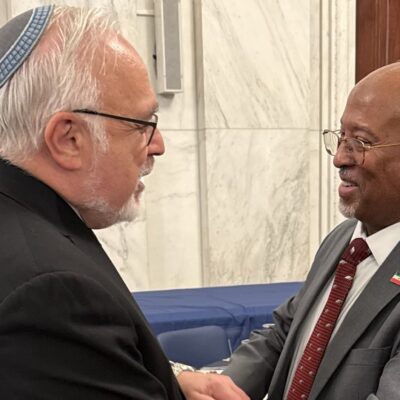
GETTY IMAGES
Negotiations for next U.S.-Israel aid deal faces uphill battle with changing political tides
The next U.S.-Israel memorandum of understanding will need to be secured in a political environment much more hostile to Israel than 10 years ago
In September 2016, when President Barack Obama announced that the U.S. and Israel had signed a 10-year deal pledging a total of $38 billion in military assistance to Israel, the news was generally uncontroversial and greeted with bipartisan plaudits — a striking contrast to the nasty presidential campaign playing out across the country at the time.
That deal, known as the U.S.-Israel Memorandum of Understanding, is now close to expiring, and the next one — if there is a next one — will be negotiated in an entirely different political environment. Israel remains deeply enmeshed in a nearly two-year war in Gaza, with little indication of an end in sight, making forward-looking negotiations more difficult.
A new MOU is not a given. U.S. support for Israel has dramatically declined on the left, and it is fracturing in isolationist corners of the right as well. Even some staunchly pro-Israel Republicans have grown wary of foreign aid in general, a shift that could affect U.S. policy toward Israel.
“When many of the threats that have faced Israel in the past have been largely neutralized, Israel will need to figure out how to make the case that it is in need of over half of the U.S. security assistance budget,” a former Biden administration State Department official told Jewish Insider. “They will need to demonstrate the threats that they face in order to warrant this level of funding when Hamas has been decimated, when Hezbollah is a shadow of what it once was, when Iranian air defenses are nonexistent and Israel has proven its ability to be able to infiltrate Iran.”
The conversation about the next U.S.-Israel MOU came to the fore last month, when Pete Buttigieg, the former transportation secretary and a potential 2028 Democratic presidential candidate, became the first prominent Democrat to say the U.S. should not enact another 10-year military aid deal with Israel.
No other potential Democratic presidential contenders have weighed in on the issue, though it could become a litmus test for a party whose base is steadily turning more hostile to Israel.
The current U.S.-Israel MOU, which expires in 2028, is the countries’ third. President Bill Clinton and Israeli Prime Minister Ehud Barak signed the first 10-year MOU in 1999. It was meant as a way to phase out U.S. economic aid to Israel, which Jerusalem no longer needed as an emerging economic and technological powerhouse. Another MOU was negotiated by President George W. Bush and completed in 2007.
“Ten-year MOUs have communicated an ongoing, consistent and bipartisan commitment to support Israel’s security by crossing administrations and demonstrating that it’s an ongoing relationship,” said former U.S. Ambassador to Israel Dan Shapiro. “It allows planning for big ticket acquisitions.”
The long-standing commitment allows Israel to plan to make large purchases that could take several years to acquire, such as fighter jets.
The MOU is not actually a binding agreement, it’s a framework. Congress must still approve the $3.3 billion in military financing and $500 million in missile defense laid out in the MOU each year during the annual appropriations process, and could do so even in the absence of an MOU.
“It’s simply a political commitment that Congress and the president can honor or not honor, and not having an MOU does not necessarily mean that we won’t have foreign military financing,” said Brad Bowman, an analyst at the Foundation for Defense of Democracies and former national security advisor to Sen. Todd Young (R-IN).
“But if we’ve had MOUs with Israel for so long under presidents of both parties, to not have one, I think, would really be quite a political statement about what’s going on with Israel, and would undermine the efforts of both Americans and Israelis to do necessary planning,” Bowman added.
“Both the left and the right are having deep reservations about the U.S.-Israel relationship, and that could very much have negative consequences for the MOU,” a former Biden administration State Department official said.
Congress has in the past weighed in to signal its support for the MOU. In 2016, Congress voted overwhelmingly to endorse the new MOU, with 405 members of the House voting for the measure. Just four representatives — all Republicans — voted against the bill. Only one of them, Rep. Thomas Massie (R-KY), is still in the House.
Since then, American support for Israel has shifted significantly, particularly since Israel’s response to the Oct. 7 Hamas attacks in 2023. A Quinnipiac poll released in August found that 60% of voters oppose sending more military aid to Israel for its war with Hamas, while only about one-third (32%) support it.
Meanwhile, only 13% of Democrats say their sympathies lie more with the Israelis than the Palestinians, a decline from 34% when asked the same question in November 2023. Far more Republicans side with the Israelis — 66% — but that’s down from 80% in November 2023.
“Both the left and the right are having deep reservations about the U.S.-Israel relationship, and that could very much have negative consequences for the MOU,” the former Biden State Department official said.
Congressional efforts to place conditions on American military aid to Israel have gained steam since Oct. 7.
Twenty-seven Senate Democrats voted last month on a resolution to block the shipment of certain weapons to Israel. The measure was largely symbolic and destined to fail in the Republican-led Senate. Still, even with an MOU, Congress would not be prevented from passing a bill further restricting U.S. aid to Israel.
“We continue to have an interest in ensuring that Israel can defend itself. They continue to be an important partner in the Middle East addressing many threats that threaten them, but also threaten us,” said former U.S. Ambassador to Israel Dan Shapiro. “If our relationship with Israel were to become far less supportive and far less intimately connected, we would quickly see a decline in our influence much more broadly in the region. That doesn’t mean we can’t also have critical conversations and use our leverage as a provider of assistance when we have concerns about Israeli military actions.”
That’s not considering the leeway given to the State Department, which approves arms sales. Last year, President Joe Biden held up a shipment of 2,000-pound bombs for months over concerns about Israel’s incursion into Rafah.
The Trump administration, which would be the one to negotiate and sign off on a new MOU before its expiration, has not yet indicated any reservations with the process.
Israel is by far the largest recipient of U.S. foreign military financing. The U.S. and Jordan have their own security MOU, though Jordan receives roughly a tenth of the annual military aid that Israel gets. Shapiro, the former U.S. ambassador to Israel, said the reason for the high level of support goes beyond Israel, and deep into the Middle East. He urged the U.S. to raise concerns with Israel about its conduct when issues arise, but not to cut into the aid itself.
“We continue to have an interest in ensuring that Israel can defend itself. They continue to be an important partner in the Middle East addressing many threats that threaten them, but also threaten us,” he said. “If our relationship with Israel were to become far less supportive and far less intimately connected, we would quickly see a decline in our influence much more broadly in the region. That doesn’t mean we can’t also have critical conversations and use our leverage as a provider of assistance when we have concerns about Israeli military actions.”
It would be tempting for Israel to try to increase its defense production to account for such a turbulent political environment. Israel has grown its military exports substantially in recent years and some Israeli lawmakers have indicated they’d like to phase out reliance on U.S. aid, but it would be very difficult for Israel to domestically produce everything it needs.
“The problem is that’s never going to happen,” Bowman said. “Israel, as impressive as it is, is never going to be completely self-sufficient in producing its own weapon systems. The United States is not. If we’re not, Israel never will be. Israel is a technology superpower. It’s not an industrial superpower.”






